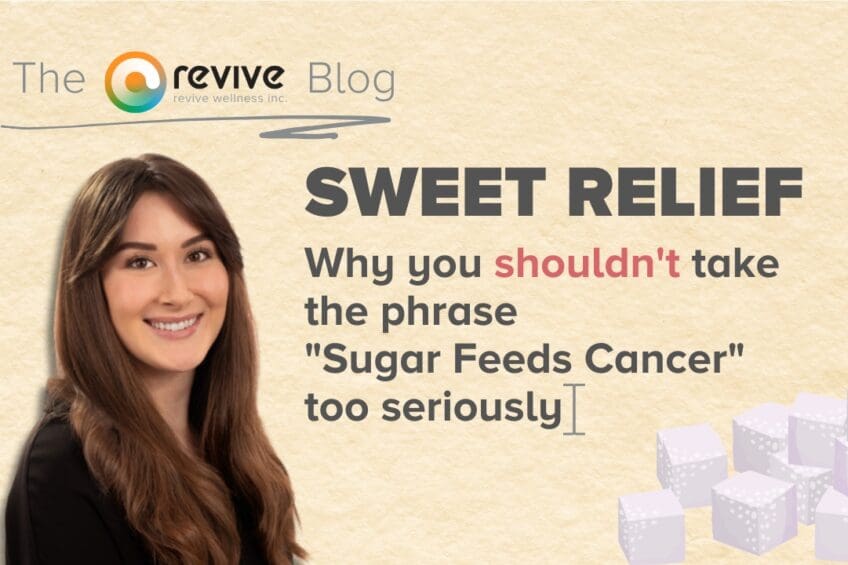Sweet Relief: Why You Shouldn’t Take the Phrase “Sugar Feeds Cancer” Too Seriously
- Laura Velcoff
- June 22, 2024
Regardless of where you are on your cancer journey, you’ve likely heard people say that “sugar feeds cancer”. Advice based off this phrase tells you that you should get rid of all sources of sugar and carbs in your diet to “starve” your cancer. Today, I’ll be explaining why this advice, although perhaps well-intentioned, can be harmful and counterproductive.
The Science Behind the Claim
While it’s true that cancer cells tend to “eat” or use more sugar (glucose) than regular cells, it’s not as scary as it sounds. Our cells usually use a process called aerobic respiration to turn glucose into energy, but cancer cells take a shortcut. They often go for a less efficient way called “glycolysis,” which produces less energy, but consumes glucose much faster. It’s like cancer cells are in a rush to use glucose, and don’t care as much about the energy that comes from it. [1]
Where the Logic Falls Apart
Sugar on its own isn’t the bad guy causing cancer or making it grow like crazy. You can’t “starve” cancer by cutting out sugar from your diet. Turns out, those tricky cancer cells find a new energy source when sugar is off the menu. [2]
Scientists have looked into whether low-carb or sugar diets help regular cancer treatments work better, but until recently, most of these studies were done on animals or in test tubes, not humans. Not to mention, the results haven’t shown a strong link to better outcomes, and these diets might even cause unhealthy weight loss. [3]
Why This Can Be Harmful
Here’s the important part – cutting sugar and carbs could mess with your overall health, especially during cancer treatment. Your body needs glucose for energy, and you want to be as strong as possible during this time. Extreme diets are not the answer.
Balance is key! You can cut back on sugary treats, but it’s okay to have everything in moderation. Research suggests that a balanced diet with whole grains, lean proteins, veggies, and fruits can help prevent cancer and its recurrence. [4,5] Remember, you didn’t cause your cancer by eating sugar or carbs. Restricting yourself when you need energy isn’t helpful.
The Role of Nutrition Counselling
I’m all about taking a personalized approach with my clients during their cancer journey. I love to bust cancer myths together and navigate treatments, side effects, and symptoms with your overall health in mind. I prioritize not just your nutrition but also your mental health. Rest assured, my advice is backed by solid evidence in nutrition and cancer. Let’s get started on your journey through cancer and beyond!
REFERENCES
1. Upadhyay M, Samal J, Kandpal M, Singh OV, Vivekanandan P. The Warburg effect: insights from the past decade. Pharmacol Ther. 2013;137(3):318-330. doi:10.1016/j.pharmthera.2012.11.003
2. Almeida L, Denis A, Ferrand N, Tommaso L, Prunet A, Sabbah M, Villa C. Evolutionary dynamics of glucose-deprived cancer cells: insights from experimentally informed mathematical modelling. JR Soc Interface. 2024;21(210):20230587. doi:10.1098/rsif.2023.0587
3. Römer M, Dörfler J, Huebner J. The use of ketogenic diets in cancer patients: a systematic review. Clin Exp Med. 2021;21(4):501-536. doi:10.1007/s10238-021-00710-2
4. Kohler LN, Garcia DO, Harris RB, Oren E, Roe DJ, Jacobs ET. Adherence to Diet and Physical Activity Cancer Prevention Guidelines and Cancer Outcomes: A Systematic Review. Cancer Epidemiol Biomarkers Prev. 2016;25(7):1018-1028. doi:10.1158/1055-9965.EPI-16-0121
5. Makarem N, Lin Y, Bandera EV, Jacques PF, Parekh N. Concordance with World Cancer Research Fund/American Institute for Cancer Research (WCRF/AICR) guidelines for cancer prevention and obesity-related cancer risk in the Framingham Offspring cohort (1991-2008). Cancer Causes Control. 2015;26(2):277-286. doi:10.1007/s10552-014-0509-9
About the Author

Laura Velcoff
My interest in nutrition started during my college years as a volleyball athlete, where I experienced firsthand the impact of diet on performance. While my initial focus was on sports nutrition, life led me to develop a passion for nutrition in gut health and cancer.

